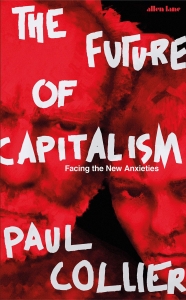Book Review | The Future of Capitalism: Facing the New Anxieties by Paul Collier
In The Future of Capitalism: Facing the New Anxieties, Paul Collier offers a forthright discussion of capitalism today that seeks to diagnosis and propose remedies for the anxieties shaping divisions between families, cities and nations. Staying away from clichés, ideology or populism, Collier calls our attention to pragmatism and the ‘hard centre’, and he is impressive in doing so in this notable book, writes Mehmet Emin Bayram.

Picture: haru_q (CC BY SA 2.0) licence
The Future of Capitalism: Facing the New Anxieties. Paul Collier. Allen Lane. 2018.

Prominent economist Paul Collier offers a forthright discussion of capitalism in his new book with candid personal touches. Shedding light on a topic under constant discussion, Collier undertakes diligent work in The Future of Capitalism. Staying away from clichés and easy dichotomies, the book provides readers with a deeper analysis of capitalism. The foundations of capitalism’s success – the balance between freedom and responsibility, reinforced by the welfare state – are given as core parts of the solution by Collier for the rising and frightening divisions between families, cities and nations. The Future of Capitalism is a thought-provoking and substantial book for anyone concerned by the ‘brave new anxieties’ of the twenty-first century, such as the erosion of confidence in the future of the social safety net, increased pessimism among the working classes and growing support for political extremes.
The life of Collier contributes significantly to this book. As both a respected academic and a concerned person, Collier connects his life with the rising anxieties. When he speculates about divisions between metropolitan and provincial cities, examples include his hometown of Sheffield. Divisions between the classes are also analysed through reference to himself and his cousin. Last but not least, arguments regarding the global divide between countries are not only drawn from cold facts but also from insights distilled from Collier’s research in Africa. Combined with academic knowledge, these personal touches allow the reader to grasp the book more deeply, provoking one to undertake similar reflections on one’s own life in relation to the book’s arguments.
According to Collier, it is not capitalism itself that is causing the anxieties; instead, ‘capitalism needs to be managed not defeated’ (18). Revisiting Adam Smith and the concept of ‘economic man’ initially, Collier installs the alternative concept of ‘social man’ as the cornerstone of his book, emphasising reciprocity and dignity as its core values. These values, Collier argues, are easy to detect in early works of capitalism, including those of Smith, most especially The Theory of Moral Sentiments. Nevertheless, capitalism, due to the effects of utilitarian, Rawlsian and libertarian backlashes, has lost these values and is failing to deliver prosperity today.
The result is ‘the Rottweiler society’ – a society drifting towards aggression, humiliation and fear, Collier states (46). Divisions between classes, cities and countries are also given as the results of this failing. A pragmatic approach is suggested as an answer to such problems by Collier. He proposes an ethical capitalism, built on values and shaped by practical reasoning (43). Thereafter, conceptualisations of the ‘ethical state’, the ‘ethical firm’, the ‘ethical family’ and the ‘ethical world’ are introduced as key tenets of the theory. After some elaborated observations, Part Four concludes the book with discussion of how to restore an inclusive politics.
The book’s discourse is powerful – Collier has aimed to write a work that can be read by any person who is concerned about the current or future situation of capitalism. Rather than applying ready-to-use ideological or populist solutions from either the left or right, Collier instead tries to cover the ‘hard centre’.
To create the hard centre, he first advises changes to political mechanisms. He recommends confining the selection of the party leader to the elected representatives of that party rather than leaving it to members. Elected representatives are less prone to choose charismatic populists due to their interest in appealing to a wide group of voters (206). This interest would also push them towards centrist candidates.
Secondly, he advocates for reversing the new divergence between the metropolis and ‘broken cities’ – cities which became worse off due to global competition, such as Sheffield with its collapsed steel industry. By taxing the huge increase in the rents of agglomeration generated in the metropolis and using this to revitalise broken cities, Collier thinks the divergence could be mitigated.
Thirdly, to reverse the gap between the highly skilled educated and the deskilled less educated, he requests ‘social maternalism’ and curbing the ‘predatory’ behaviours of the highly skilled (208). Social maternalism – intensive practical assistance, mentoring rather than monitoring and cooperating more with NGOs – instead of social paternalism will serve to deliver more to the less educated. Heavier taxes on sectors such as asset management, on the other hand, will nudge the highly skilled towards socially valuable sectors such as innovation (187). Finally, for the divide between the nations, he offers international organisations that build new reciprocal obligations (210). Supra-national organisations have lost their capacity to forge reciprocal obligations, which has led to the race to the bottom (194).
Collier does great work in diagnosing the problem and roots of them. Yet, while he convincingly answers the questions of ‘why?’ and ‘what?’, his ideas for ‘how to solve it?’ lack detail. True, he avoids clichés for answers, yet this doesn’t make his alternatives entirely convincing. Taxing the agglomeration over the metropolises, as he admits, is not an easy task (207); neither is curbing the behaviours of the highly skilled. The solutions presented by the author are, therefore, more helpful for setting the direction of action rather than providing a recipe. Collier does a better job when he addresses the anxieties, determines their roots and calls for action against them. However, ultimately, the lack of detail in solutions is understandable when it is considered that this is a short book with a wide remit.
To conclude, Collier delivers a remarkable work in the midst of heated discussions about capitalism, especially its future. His mix of theory and practice, enhanced with personal touches and forthright discourse, makes his book special. Staying away from clichés, easy-to-copy ideologies or easy-to-follow populism, Collier calls our attention to pragmatism and the ‘hard centre’, and he is impressive in doing so in this notable book. Definitely one to read.
This review gives the views of the author, and not the position of Democratic Audit. It was first published on the LSE Review of Books blog.
Mehmet Emin Bayram is a Graduate Student from Hanyang University Graduate School of International Studies, South Korea. He holds BSc degrees in History (High Honours) and International Relations (Honours) from TOBB University of Economics and Technology, Turkey. His studies focus on institutions (primarily economic and political ones), their creation, effects and interactions at the intersection of history and politics.





 Democratic Audit's core funding is provided by the Joseph Rowntree Charitable Trust. Additional funding is provided by the London School of Economics.
Democratic Audit's core funding is provided by the Joseph Rowntree Charitable Trust. Additional funding is provided by the London School of Economics.